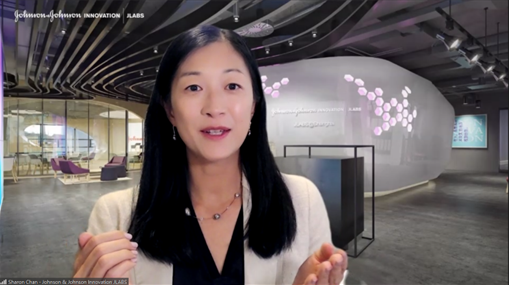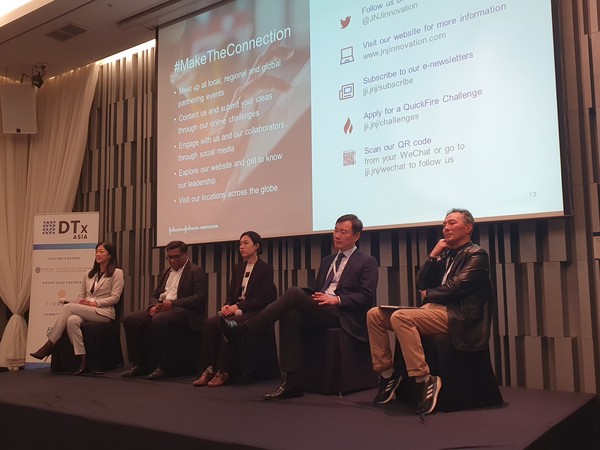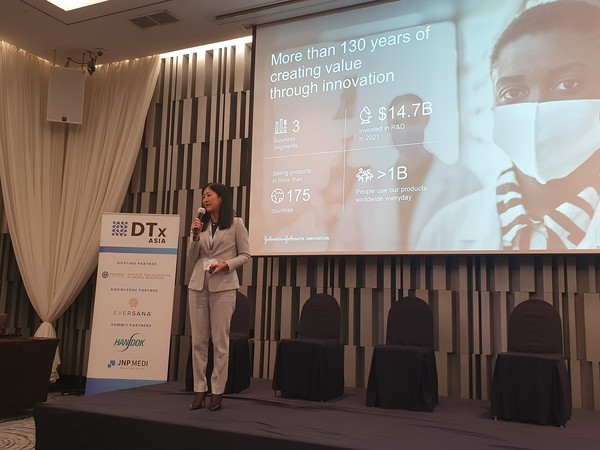Many might be surprised to learn that companies like Uber were once small start-ups. Similarly, in the medical space, technology-driven healthcare solutions have seen rapid growth with the explosion of artificial intelligence (AI) boosting the success of Korean companies like VUNO, Lunit, and 3billion.
The support for the AI industry in Korea is strong but other healthcare fields still need support to bring their solutions to market.

On this note, Sharon Chan, head of Johnson and Johnson (J&J) Innovation – JLABS Asia Pacific, explained the origins of the JLABS network which was initiated by Melinda Richter, head of JLABS Global. JLABS is J&J’s incubator for life science and biotech companies.
“It started as an experiment, but we wanted to make the life science industry as appealing as the tech industry to attract more investors,” she said.
Korea Biomedical Review connected with the JLABS APAC head to discuss how J&J is currently supporting healthcare innovators in the Asia Pacific region.
“Thanks to the growing demand for quality healthcare and a corresponding growth in local innovation hot spots, Asia’s innovation ecosystems are booming,” said Chan.
‘Great ideas can come from outside of J&J, collaboration is key’
Chan who was recently promoted to JLABS APAC head this year in May previously served for approximately four years as the Head of JLABS in Shanghai, the largest incubator and first in the APAC region.
“I've always been interested in science and bringing unmet solutions to patients,” she said.
JLABS's incubator network provides early-stage innovators with access to capital-efficient lab space and resources, as well as mentorship, industry connections, and entrepreneurial programs to support them in creating the next great healthcare breakthrough.
Before this, J&J’s QuickFire Challenge helps identify potential healthcare discoveries from global innovators.
“We've incubated over 860 companies globally including over 70 through JLABS at Shanghai and are particularly proud to have 12 awardees from our Seoul QuickFire Challenges (QFC) over the last six years. Currently, five Korean companies have been incubated including Bridge Biotherapeutics, DC Medical, SKIA, Lillycover, and VPIX Medical,” said Chan. “Most recently, Portrai and siRNAgen Therapeutics won the 2022 Seoul QFC, and we are delighted to welcome them to the global JLABS network.”

“We know that great ideas can come from outside the walls of J&J so we provide regional points of entry for life science and health technology innovators to access J&J’s unique breadth and depth of offerings.” said the JLABS APAC head.
Chan explained why she holds this mission close to her heart.
Twenty years ago, Chan started working with a Japanese biotech startup and more recently with the Bill and Melinda Gates Foundation to build a presence in China for their tuberculosis (TB) vaccines.
However, she realized that after five years of working with governments, academia, patients, clinicians, other non-profit organizations, and even high-network individuals in Beijing, the TB vaccine they were developing needed an industry partner like J&J.
“No matter how much money you throw at the problem, without the right industry or commercialization partner, no one, not even Bill Gates can do it alone. No single company has a monopoly on innovation,” she said.
Consequently, in her present role as head of JLAB's APAC, she closely supports healthcare innovators as they navigate the challenging journey of taking a product or innovation from concept to commercialization. This includes connecting them with the right resources, the right people, and the right expertise so they can focus on their potential solutions to accelerate innovation and bring viable healthcare solutions more quickly to patients.
“Collaboration is at the core of advancements in healthcare and there is no better place to do this than Asia where innovation ecosystems are booming thanks to the growing demand for quality healthcare and corresponding growth in local innovation hot spots,” Chan said.
‘We allow start-ups to focus on innovation while maintaining intellectual property’
“Like many great things, JLABS started as a spark, an idea, and a home to make life science innovation just as advanced and appealing as the tech industry so that the best talents and the best investors will be incentivized to join,” said JLABS APAC head. “It started as an experimental approach to external innovation for us and the pharmaceutical industry as a whole but today it's an integral part of our open innovation strategy.”
Globally, J&J boasts a very successful track record with around 80 percent of all JLABS incubated companies still in business, including 47 companies publicly traded and 38 acquired.
She went on to explain that the incubator allows resident companies to maintain complete entrepreneurial freedom thanks to its no strings attached policy so early-stage companies can focus on scientific innovation while maintaining their intellectual property.
Regarding the incubation timeline in Korea, she mentioned that on average, companies at JLABS Shanghai incubate for one to three years but even after graduation, innovation does not stop and neither does J&J’s support as relationships are nurtured through the JLABS alumni network. The incubation period is mainly influenced by the developmental stage of the product or idea.
Chan remarked, “It's a natural step for companies to eventually graduate from JLABS and we are proud when companies move on to start their next chapter.”
In this regard, she mentioned that over 200 companies from our global resident portfolio have formed at least one agreement with a J&J company.
Most inspiring start-ups that passed through JLABS APAC
Chan also shared that JLABS Shanghai has supported 72 companies since first opening the branch in June 2019 which has raised over $3.5 billion in financing and strategic relationships.
This year alone we have welcomed companies from mainland China, Hong Kong, Korea, Canada, and India with a diverse portfolio of 41 companies in the pharmaceutical space, 21 in the combined area of medical technology, 10 in consumer health, and 12 working on cross-sector solutions.
She highlighted a few memorable start-ups like a urine test for cancer from a Japanese start-up, a wearable ECG monitor from Singapore, a technology that can turn your phone into a diagnostic tool for infectious and chronic diseases and women's health from a Taiwanese start-up, and solutions to sustain collagen levels in the skin for anti-aging purposes from China and more.
The role of start-ups in addressing emerging APAC healthcare needs
“Healthcare challenges are more complex than ever and the bar is high to deliver truly transformational innovations,” said Chan. “By collaborating to develop the industry together, we're creating jobs, building an ecosystem to produce differentiated and sustainable solutions, generating connections to facilitate partnerships between small and large companies alike, nurturing talent, and helping entrepreneurs fail-fast and quickly move forward at unprecedented speeds.”

Life expectancy over the last century has increased by approximately 60 percent due to a better understanding and management of disease but the region still faces several challenges. For example, the aging population is one of the most pressing issues, with one in four people projected to be over 50 years old by 2050 which is linked to an increased disease burden in cancer and chronic diseases, she said.
More than 60 percent of the world's diabetic patients live in Asia in a rapidly evolving diabetes epidemic and three-quarters of the world's chronic HPV and hepatitis B patients are in Asia. Roughly half the cancer cases and more than half of the cancer deaths are in the region with dementia also painting a similar picture in the region.
On that note, she said, “Startups and entrepreneurs are vital in addressing these unmet needs but they too face considerable challenges in bringing innovation to patients. At JLABS, we understand that bringing a product to market isn't easy and are here to support these endeavors.”
Selection criteria and advice to young start-ups
When asked about the selection criteria, Chan replied, “Firstly we look for transformational and differentiated science solutions, then assess the unmet need, the management team, and the strategic alignment of the solution."
Digging deeper into the unmet needs, she emphasized that it’s not just about the disease burden but being able to address the disease with a transformational and commercially viable solution.
“At JLABS, a great idea can come from anywhere and so we incubate companies from as early as pre-seed, seed, series A and B, across different fields and geography. Once we believe in that entrepreneur, we will welcome the science into the JLABS portfolio and help it succeed.”
Sharing her perspective on the successful qualities of start-up CEOs, Chan said, “One thing I consistently observe is their ability to remain agile, their openness to learning from even the hardest situations, and their ability to adapt to new ways of working when challenges come knocking.”
This means learning to embrace failures, and tolerating ambiguity because as entrepreneurs, there are few things within your control, she reasoned.
Accordingly, she highlighted a few examples. “During the pandemic, many of our startups especially in the APAC region at the beginning of the pandemic wanted to help and so they adapted their technology platforms to address Covid-19.”
"Start-ups working on oncology, women’s health, and small molecules for Alzheimer’s disease switched focus to infectious disease to develop solutions for fighting the pandemic issues,” she said praising the start-ups at JLABS for displaying a remarkable sense of responsibility and adaptability.
Related articles
- DTx start-ups share success stories for innovating healthcare in the APAC region
- J&J’s Seoul Innovation QuickFire Challenge returns with 150 million won prize
- [KBR Meets Asia-Pacific Pharma Industry Leaders] 'GLP-1 effective in treating both diabetes, obesity'
- Nu Eyne’s electroceutical targets tissue regeneration, anticancer effect

